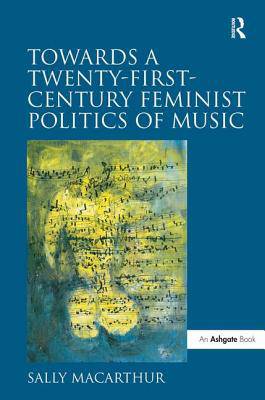
- Retrait gratuit dans votre magasin Club
- 7.000.000 titres dans notre catalogue
- Payer en toute sécurité
- Toujours un magasin près de chez vous
- Retrait gratuit dans votre magasin Club
- 7.000.0000 titres dans notre catalogue
- Payer en toute sécurité
- Toujours un magasin près de chez vous
305,45 €
+ 610 points
Format
Description
Towards a Twenty-First-Century Feminist Politics of Music opens up a new way of thinking about the absence of women's music. It does not aim to find 'a solution' in a liberal feminist sense, but to discover new potentialities, new possibilities for thought and action. Sally Macarthur encourages us, with the assistance of Deleuze, and feminist-Deleuzian work, to begin the important work of imagining what else might be possible, not in order to provide answers but to open up the as yet unknown. The power of thought - or what Deleuze calls the 'virtual' - opens up new possibilities. Macarthur suggests that the future for women's 'new' music is not tied to the predictable and known but to futures beyond the already-known. Previous research concludes that women's music is virtually absent from the concert hall, and yet fails to find a way of changing this situation. Macarthur finds that the flaw in the recommendations flowing from past research is that it envisages the future from the standpoint of the present, and it relies on a set of pre-determined goals. It thus replicates the present reality, so reinforcing rather than changing the status quo. Macarthur challenges this thinking, and argues that this repetitive way of thinking is stuck in the present, unable to move forward. Macarthur situates her argument in the context of current dominant neoliberal thought and practice. She argues that women have generally not thrived in the neoliberal model of the composer, which envisages the composer as an individual, autonomous creator and entrepreneur. Successful female composers must work with this dominant, modernist aesthetic and exploit the image of the neo-romantic, entrepreneurial creator. This book sets out in contrast to develop a new conception of subjectivity that sows the seeds of a twenty-first-century feminist politics of music.
Spécifications
Parties prenantes
- Auteur(s) :
- Editeur:
Contenu
- Nombre de pages :
- 206
- Langue:
- Anglais
Caractéristiques
- EAN:
- 9781409409823
- Date de parution :
- 28-12-10
- Format:
- Livre relié
- Format numérique:
- Genaaid
- Dimensions :
- 156 mm x 234 mm
- Poids :
- 467 g

Les avis
Nous publions uniquement les avis qui respectent les conditions requises. Consultez nos conditions pour les avis.






